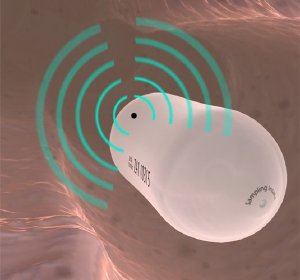Dec 8 2009
A children's book about the 'nano-pill'. A spectacular 3D glimpse into this very phenomenon during his 'Dies Natalis' Lecture. Albert van den Berg has other ideas for the newly awarded Spinoza Premium besides high-powered research. He wants to communicate his work to the broadest possible audience.

Ronald Plasterk, Dutch Minister of Education, who presented the Spinoza Premiums on 25 November, also received a copy of 'A pill with a lab inside' ('Een pil met een lab erin'), which explains the research of Albert van den Berg to eight-year-olds. The guests at the Spinoza ceremony were treated to a sneak preview before the book goes on sale in January. Van den Berg: "I said from the beginning that I would spend some of the money on explaining what I do. What better place to start than the earliest age group?" The book, written by Martine Letterie, tells the story of Nanne and Floor, who get to take a peek inside the Nanolab of MESA+ on the UT campus. Then, in the hospital, they meet oncologist Bob Pinedo who is busy developing a nano-pill with Albert van den Berg so that colonic cancer can be detected at an early stage. A serious story packed with thrilling adventures.
No more painful examinations
"Colonic cancer is one of the most common cancers in people over the age of 50", says Van den Berg. "The Dutch Health Board has already advised endoscopic or colonoscopic screening for people in this age group. But this is a painful and uncomfortable experience. What is more, it presents a logistical nightmare. And nothing is found in 95% of cases. What we need is a simple first-line test. The only alternative at present is a faeces test, but eventually, a nano-pill will provide a much more patient-friendly alternative." The nano-pill will be a lab-on-a-chip with nano threads which detect tiny cancer-specific DNA fragments long before the tumour develops. That way, colonic cancer - or a predisposition for colonic cancer - can be identified far sooner. You simply swallow the pill, which is later expelled naturally. "Picture a situation in which the results are passed on to the doctor via a mobile phone. Technically this is already possible", says Van den Berg, who previously received a grant from the European Research Council for his eLab4Life project.
Quality of life
The nano-pill is not yet ready, but Albert van den Berg's research group is working on another system that is almost market-ripe. This system monitors lithium levels in the blood of patients with bi-polar disorders. A major healthcare insurer in The Netherlands found this important for the quality of life: instead of a lab test with the inevitable waiting times and uncertainty, a simple jab will deliver an almost immediate result. MediMate, the spin-off that is developing a compact measuring device on the basis of a chip, is currently working hard on the market launch. Van den Berg: "Chip technology will dramatically lower healthcare costs and improve the quality of care at the same time. Soon we will be able to apply the same technology to monitor potassium in kidney patients. We are already monitoring calcium in cattle to prevent milk disorders." Blue4Green, the spin-off that developed this system, recently won the Young Technology Award.
Migraine
"One of the best offshoots of this year's Spinoza Premiums is that we have joined forces in a new project to research the causes of migraine. Michel Ferrari is a top international specialist in this field and Marten Scheffer knows all about the complex transitional situations that play a role in migraine. We can develop chips to measure glutamate, one of the neurotransmitters. This is the first time that prize-winners have come together in this way. In fact, the project was already in the pipeline when the announcements were made in June."
During the Dies Natalis (Foundation Day) Lecture on 27 November 2009 Albert van den Berg introduced the public to the 'chips for life' and the nano-pill. Wearing 3D goggles everyone could take a look inside the phenomenon known as lab-on-a-chip.